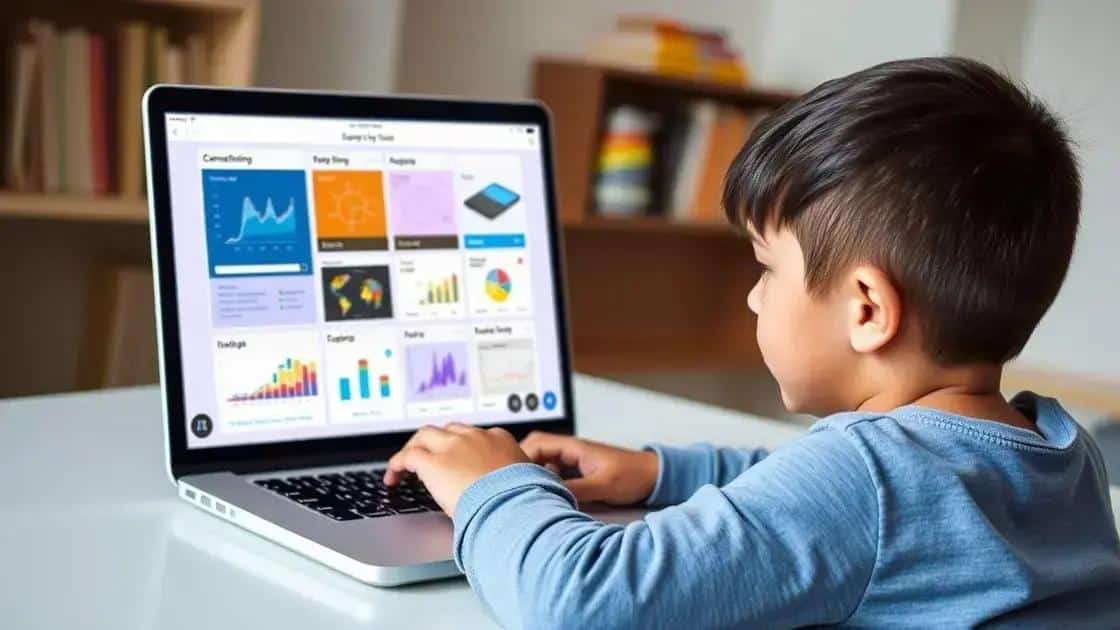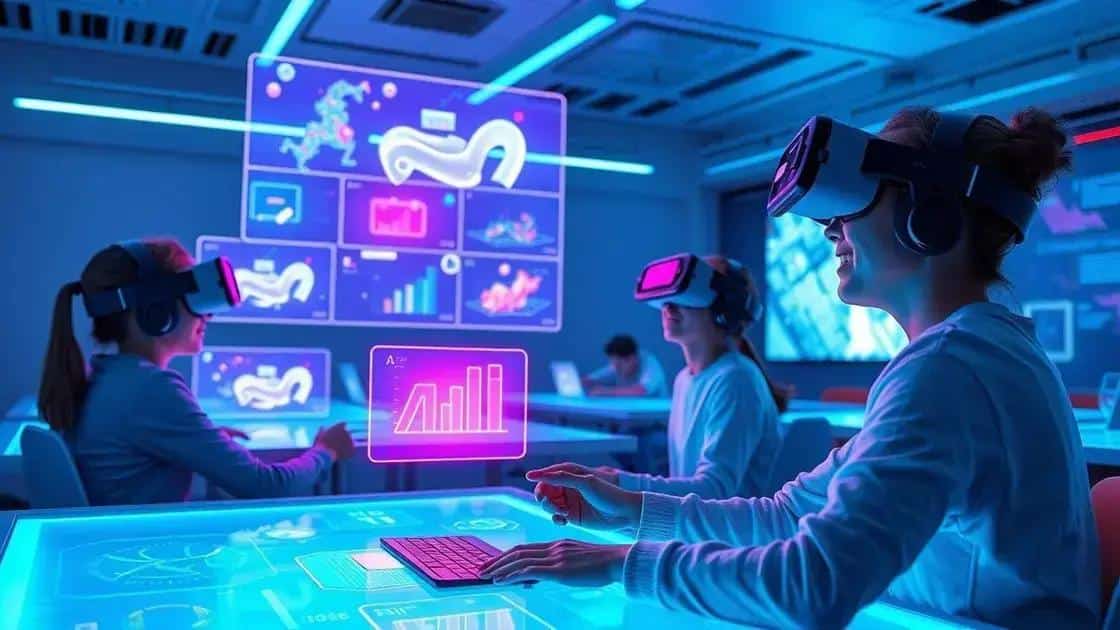Remote learning platforms trends: what to expect in 2023

Remote learning platforms are evolving with advancements in AI, immersive technologies, and data-driven insights, enhancing personalization, community engagement, and global collaboration for a more effective educational experience.
Remote learning platforms trends are reshaping education as we know it. With new technologies and teaching methods emerging, have you wondered how this might affect your learning experience?
Emerging technologies in remote learning
Emerging technologies in remote learning are changing the way we think about education. As we explore these advancements, it’s clear that both students and teachers benefit from enhanced learning experiences. This evolution is driven by various tools that increase engagement, accessibility, and interaction.
Interactive video platforms
One of the standout technologies is interactive video platforms. These allow teachers to connect with students in real time, offering an immersive experience that traditional methods lack. Features like polling, quizzes, and breakout rooms encourage participation, making learning more dynamic.
Artificial Intelligence in education
Artificial Intelligence (AI) is also revolutionizing remote learning. AI-powered tools can tailor learning experiences to individual student needs, identifying strengths and weaknesses. This personalization helps students grasp concepts more effectively, supporting their unique paths to learning.
- AI chatbots for instant support
- Adaptive learning platforms
- Data analytics for progress tracking
Moreover, tools like gamification are gaining traction. Incorporating game-like elements into learning can boost motivation and engagement. This approach turns typical subjects into fun challenges, making education appealing to a wider audience.
Finally, virtual reality (VR) and augmented reality (AR) are breaking boundaries in remote learning. These technologies offer immersive experiences where students can explore environments and scenarios that enrich their understanding of various subjects. Imagine studying biology by virtually walking through a cell or exploring historical events in a 3D model.
Personalization in online education

Personalization in online education is becoming essential for effective learning. With diverse learners accessing content from various backgrounds, customizing education experiences helps students achieve their potential. Personalization involves adapting learning paths based on individual needs, preferences, and goals, ensuring that every student can engage meaningfully with the material.
Tailored learning experiences
One way to implement personalization is through tailored learning experiences. This method allows students to focus on topics that interest them, fostering deeper engagement. By analyzing a student’s performance and feedback, educational platforms can recommend specific resources or lessons that align with their strengths.
Learning analytics
Learning analytics play a significant role in personalization. These analytical tools assess a student’s progress and engagement levels. By leveraging this data, educators can create customized strategies and interventions that motivate students to improve. For teachers, this insight helps identify which methods are most effective based on real-time data.
- Personalized feedback and assessments
- Adapting content difficulty based on performance
- Curated resource recommendations
Moreover, the opportunity for students to pursue their learning goals at their own pace builds confidence. In a personalized online setting, each learner can progress through material when they feel ready, rather than competing against a fixed timeline. This adds to a positive learning experience, as they feel ownership over their studies.
Technology tools like AI-driven platforms make this possible. These platforms utilize algorithms to adapt to learners’ unique schedules and preferences. With this approach, the traditional one-size-fits-all education model becomes obsolete, leading to more effective outcomes.
The role of community in virtual classrooms
The role of community in virtual classrooms is crucial for successful online learning. A strong community fosters connection, support, and engagement among students and teachers. When learners feel a sense of belonging, they are more likely to participate actively and take ownership of their education.
Building relationships
In virtual classrooms, building relationships is vital. Through discussion forums and group projects, students interact with peers, creating bonds that enhance their learning experience. These connections provide a network of support, where students can share ideas, resources, and encouragement.
Peer collaboration
Peer collaboration is another essential aspect of community in online education. Working together on assignments or study groups helps students learn from one another. This collaborative approach not only strengthens understanding but also cultivates teamwork skills that are valuable in the real world.
- Group projects that encourage cooperation
- Study groups for shared learning
- Social media platforms for informal communication
Moreover, instructor involvement plays a significant role in nurturing this community. When teachers actively engage with students through feedback and open discussions, it cultivates trust and encourages students to express their thoughts. This engagement can lead to more meaningful interactions overall.
Regular virtual events, such as workshops or social gatherings, can further enhance community spirit. These events bring students together beyond academics, allowing them to bond over shared interests and experiences. Such initiatives can greatly improve overall satisfaction in online learning environments.
Future predictions for remote learning platforms

Future predictions for remote learning platforms suggest significant advancements that will reshape the educational landscape. As technology evolves, these platforms will not only enhance learning experiences but also make education more accessible to students worldwide.
Increased use of artificial intelligence
One key prediction is the increased integration of artificial intelligence in remote learning. AI will personalize education on a larger scale, adapting content to meet individual learning styles. This means students will receive tailored resources and recommendations that cater to their unique needs, enhancing learning outcomes.
More immersive learning experiences
Moreover, advancements in virtual and augmented reality will create more immersive learning environments. Imagine exploring historical sites or complex scientific concepts through VR headsets. This type of engagement can deepen understanding and retention, making learning more memorable.
- Interactive simulations for hands-on learning
- Virtual field trips to enhance curriculum
- Gamified elements to increase motivation
Additionally, collaboration tools will continue to evolve. Enhanced communication features will allow for seamless collaboration across borders, promoting global learning communities. Students from different backgrounds can work together, exchanging ideas and cultural perspectives that enrich the educational experience.
Another prediction is the growth of data-driven decision-making in education. By analyzing student performance data, educators can identify trends and areas needing improvement. This data will drive curriculum development and teaching strategies, ensuring that educational offerings meet the demands of a diverse student population.
FAQ – Frequently Asked Questions about Remote Learning Platforms
How will artificial intelligence improve remote learning?
Artificial intelligence will personalize the learning experience, adapting content to meet individual students’ needs and improving engagement.
What role does community play in virtual classrooms?
Community fosters connection among students and teachers, promoting collaboration and support, which enhances the overall learning experience.
What are immersive learning experiences?
Immersive learning experiences use technologies like virtual reality to create engaging environments where students can explore subjects more deeply.
How will data-driven insights affect education?
Data-driven insights will inform educators about student performance, helping to tailor curriculum and teaching strategies to meet diverse learning needs.





